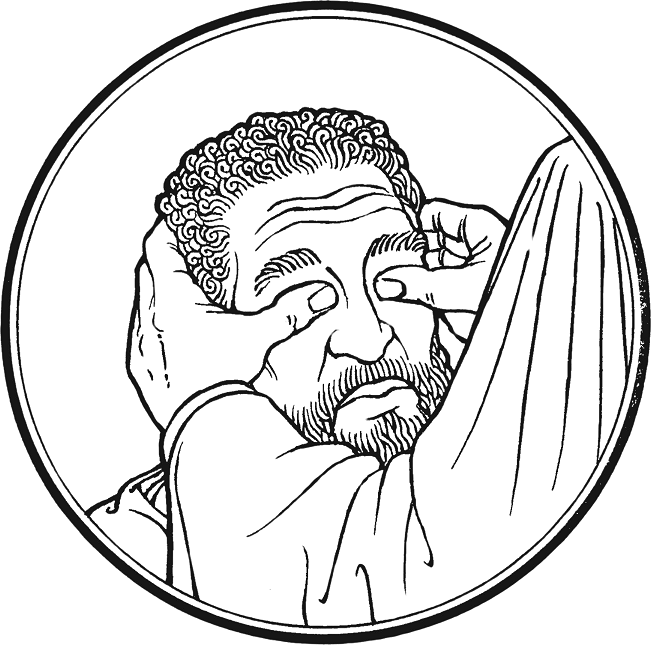Readings: 1 Samuel 16:1-13 | 1 Corinthians 13:1-13 | Luke 18:31-43
Text: 1 Corinthians 13:1-13
First Corinthians 13 is one of the most beloved passages of all Scripture. It is a favorite passage for weddings. It is written on knickknacks and tchotchkes we decorate our houses with. Pardon the pun, but we love this chapter of the Bible. And rightly so. It puts front and center what is essential to living in Christ. Without it, none of our good works, or even great works have any value whatsoever. But love covers all that we cannot do.

But by today, these words—faith, hope, and love—have become disembodied slogans. They are no more than an allegory to a lost and forgotten past, the same way the works of Homer or Virgil used to be referenced as common knowledge. Faith, hope, and love are just decals to adorn your Hobby Lobby-inspired décor.
Meanwhile, our actual lives have become whatever we want them to be. By nature and by practice, our lives are the product of philosophies and peers. And because there is nothing new under the sun, it was not much different for the Christians in Corinth.
The Stoics believed only the spiritual mattered, so they denied the body everything of meaning. The Epicureans believed only the spiritual mattered, so the indulged the body in everything, no matter how degenerate. False teachers then and now emphasized that things like tongues, prophesies, healings, and powers were how to know you were spiritual. And Paul had to correct them all, while bringing them together.
“If I speak in the tongues of men and of angels, but have not love, I am a noisy gong or a clanging cymbal. And if I have prophetic powers, and understand all mysteries and all knowledge, and if I have all faith, so as to remove mountains, but have not love, I am nothing. If I give away all I have, and if I deliver up my body to be burned, but have not love, I gain nothing.” “As for prophecies, they will pass away; as for tongues, they will cease; as for knowledge, it will pass away.” “Love never ends.”
There was nothing wrong with tongues, prophecies, knowledge, or powers. In fact, they could be good. But only so far as they loved one another. Without that divine love, none of those other things mattered. Without love, they were even a hindrance.
But what does it mean to love one another? The world alienated from God defines love differently than God and His people do. They show us that it’s a feeling you fall into. It’s a sense of comfort, of happiness. It’s your source of joy when you get what you want, and a source of sorrow when you don’t. It’s the emotion that drives people to do great things…or even terrible things. “They did it for love,” and that makes it all worth it. But love for our world is found inside you. There’s a selfishness to the world’s love. It can motivate one to do a lot, but always for one’s own sake. We want our feeling validated by others. We want to be loved in return. And when we don’t get what we want, when our feelings fade, so does our effort, our work. This “love” is a passing mist.
That’s not the kind of love that God has for us. His love is an action, not a feeling. God loves because that’s who He is, not because we have something He wants. In fact, when we do not do what He desires, He acts in love all the more, because we are in need. God’s love is selfless, self-sacrificial. And it never fades or fails.

But such a love doesn’t look like we expect it to. Love is demonstrated for us in the Gospels. In Luke 4:16-30, Jesus does not give the people in His hometown of Nazareth the signs and miracles He did in Capernaum. They wanted them, and they would have loved Him for it (at least the way the world loves). Instead, He gave them something better: His Word which declared that the Lord’s Christ was in their midst. But they would not have heard His Word if He had given them miracles.
At other times, like when He met the rich man in Mark 10, we hear,
“21 Jesus, looking at him, loved him, and said to him, ‘You lack one thing: go, sell all that you have and give to the poor, and you will have treasure in heaven; and come, follow me.’ 22 Disheartened by the saying, he went away sorrowful, for he had great possessions.” (Mark 10:21-22)
To us, it sounds like that love doesn’t get desirable results.
More importantly, do we love one another as Christ has loved us? I dare say we have not measured up too well. We have been impatient and mean to those who are not on our side. We have been envious, wishing we had what others seem to get. We have boasted about ourselves, how we know better than the rest. We have been arrogant enough to think we are better than others. Sometimes, we’re rude enough to tell that to their faces. We have insisted on our own way in all things. We have been irritable and resentful to all. We have rejoiced at wrongdoings, calling it justice, or comeuppance, or karma. We have borne little, believed little, hoped little, endured little. And had the audacity to say that we did it all in love. That kind of love cannot end soon enough.
Therefore we are to repent. We are to renounce such things. We must see all people as ones for whom Christ died, because He has—even those who irritate us the most. After all God loved us when we not only irritated Him, but openly rebelled against Him with our sin. Our neighbor needs our love. Not our feelings. Not our self-centered attempts to get what we want out of them. But self-sacrificial service. Jesus has done no less than that for us.
Christian love is Christ’s love. Christ’s love is patient, bearing with our sin, like when He was betrayed by one of His closest friends. His love is kind, caring for us though we made ourselves His enemy, like he healed the ear of the high priest’s servant as they arrested Him. HIs love does not envy, like when Jesus was falsely accused before the Sanhedrin. His love does not boast, as He remained silent before His accusers. Jesus’ love it is not arrogant. He did not elevate Himself above others—even though He is truly the Son of God—but He was humiliated before all Jerusalem for our sake as He was carried before Pilate. His love is not rude, telling even Pilate, a gentile polytheist, of the truth.

Jesus’ love, It does not insist on its own way, letting the soldiers put a reed in His hand to later be struck with, and a crown thorns upon His head in mockery. His love is not irritable, patiently bearing the blasphemous call from the chief priests and Pharisees to come down from the cross. His love is not resentful, as He even promised paradise to the repentant thief who earlier had mocked Him.
His love does not rejoice at wrongdoing, but rejoices with the truth. So at the last, He says it is finished, and gives up His Spirit. There He finished His great work of love. The ultimate self-sacrifice for every sinner. To pay for our sin, even the sin of failing to love as we ought. He gladly laid down His life for your sake and for mine. His love truly bears all things, believes all things, hopes all things, endures all things. And the cross is the place He has loved you. By action, not by feeling. Jesus died for your sake. And has purchased you out of your slavery to your sin.
The love of God never ends—not even death can snuff it out. After Jesus gave His life for your sake, He took it back up again. On the third Day Jesus rose from the dead. Another work accomplished for you, and a promise given to you. Since He died your death in your place, His resurrection is also made yours. A promise coming on the last day for you and for every believer.
“The Lord is good; his steadfast love endures forever.” (Ps. 100:5) This love is so intertwined with the cross, that Christians have made a practice of tracing the cross on themselves. That tradition is still preserved to this day, by the little Latin cross in the hymnal. Notice the places where it is:

- When we invoke His saving Name, remembering Holy Baptism where Jesus’ death becomes our death, and His resurrection our hope of the same (Romans 6:3-11)
- At the end of the Creed, where we confess our certain hope in the life of the world to come, which is made ours through the cross (Luke 18:29-30)
- Although it’s not printed, some choose to cross themselves at the final petition of the Lord’s Prayer, “Deliver us from evil,” because it is by the cross that “He disarmed the rulers and authorities and put them to open shame.” (Colossians 2:15)
This is what love actually is, by which He loved the world and us, so that He gave His only-begotten Son that whoever believes in Him shall not perish but have eternal life (John 3:16). This is what He teaches us, and in Him, we grow daily in Christian love for those same people God has loved. In the Name + of Jesus. Amen.


Leave a Reply